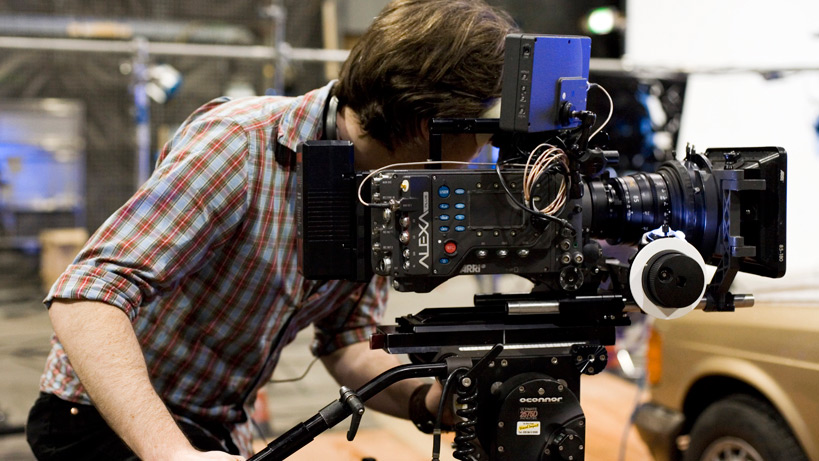What does a Camera Operator do?
Camera operators are the ones behind the scenes operating film or video cameras to capture footage for televisions shows, commercials, documentaries, events, and film. Many camera operators specialize in shooting footage for a specific industry, such as those working in the film industry or those working for an advertising firm shooting commercials.
How to Become a Camera Operator
There is no minimum requirement to become a camera operator, though a bachelor’s degree may be necessary to gain an entry level position. If you do not have experience, employers will look for applicants with a formal education in a related field such as broadcasting or film. If a camera operator is already in the field and has experience, they may not need to show a formal education as they may have built a reputation. According to O*NET OnLine, over 60% of camera operators surveyed reported having at least an associate’s degree or bachelor’s degree.
Job Description of a Camera Operator
Camera operators shoot footage with television or motion picture cameras to capture scenes for a director. They would need to be knowledgable in composition and lighting techniques to ensure the angle, lighting, and story of the scene is conveyed as intended. They would also use various lenses and filters when necessary to accurately capture the moment.
Camera Operators Career Video Transcript
Whether it’s the silver screen of 1950s Hollywood or the computer screen and YouTube of today, Americans have long carried a torch for moving pictures. When the director yells “Action” the camera operator’s eyes are glued to the camera’s lens, making sure to catch everything. There are three main types of camera operators
Studio camera operators work in broadcasting and follow directions as part of an ensemble production. They film their subjects from a fixed position. Cinematographers film motion pictures. They determine the angles, lighting, and types of equipment that will best capture a shot

Camera Operator
A camera operator records the visual images that make up movies, television shows, news broadcasts, music videos and televised news and sporting events. If you were to visit the set of a movie or television show, you would see the “cameraman” filming the action. He or she may also film live events like concerts and sports. When a news reporter broadcasts from a remote location or from a television studio, the camera operator records it for the audience at home to watch either live or at some later time
Employment Facts
There were about 21,400 camera operators employed in 2012. Most camera operators work full-time, but those who film motion pictures may have periods of unemployment between projects. There may also be times when overtime work is required to meet deadlines. Some camera operators work on a freelance basis. Jobs of this nature may require that one has his or her own equipment.
Educational Requirements
Many employers prefer to hire job candidates who have a bachelor’s degree in film or broadcasting, or in a related discipline. This formal training, however, is not enough. One needs to learn what actually goes on during film production. In order to do that, an aspiring camera operator begins his or her career as a production assistant in the camera department. After time spent doing simple tasks, which often includes running errands, he or she may become a camera assistant, before eventually becoming a camera operator.
Other Requirements
Will you make a good camera operator? The answer to this question relies on your soft skills or personal qualities. If you are creative, have good visual skills, eye-hand coordination and can pay attention to detail, you have a better chance of succeeding in this occupation than someone who does not have these qualities. You must also have good communication skills, including the ability to understand what others are telling you and the ability to convey instructions. You will have to receive and understand instructions from directors and producers as well as give instructions to your assistants.
Advancement Opportunities
Some camera operators make a career shift within the entertainment industry, eventually becoming directors or producers.
How to Become a Camera Operator
What is a Camera Operator?
While the Director and the Director of Photography set up the mood and the style for each shot, the ones who are hands-on behind each shot are Camera Operators, who combine their technical knowledge with creative input to make sure each clip is a perfect fit for the final product
Camera Operators work under the Director and Director of Photography and often work closely with technical departments to include sound and lighting. Camera Operators work across a variety of mediums recording moving images. They create the film for music videos, corporate productions, films, TV programmes, and commercials. In this article, we will be discussing what responsibilities you can expect from this role, and the key skills you will need to become a Camera Operator.
What does a Camera Operator do?
Camera Operators usually start working in early pre-productions, attending technical recces with other Heads of Department. They execute the instructions of the DoP and the Director while being responsible for their Assistants and Trainees. If and when technical issues arise, the Camera Operator is responsible for resolving these problems.
After shots have been rehearsed and the camera has been positioned by the DoP, it’s the Camera Operator’s responsibility to take care of all aspects of the operation of the equipment. Importantly, they will follow a camera script adhering to the directions of the Director. To stay ahead in this role it is important to study scripts before filming to ensure the smooth running of the production
Camera Operators have the responsibility of setting up the equipment before any shot and of keeping everything ready for any last-minute changes. They also oversee the work of their Assistants and Trainees in maintaining and preparing the equipment.
WORKING AS A CAMERA OPERATOR
What Does A Camera Operator Do
Film and video editors and camera operators manipulate images that entertain or inform an audience. Camera operators capture a wide range of material for TV shows, motion pictures, music videos, documentaries, or news and sporting events. Editors take footage shot by camera operators and organize it into a final product. They collaborate with producers and directors to create the final production
How To Become A Camera Operator
Film and video editors and camera operators typically need a bachelor’s degree in a field related to film or broadcasting
Education
Most editor and camera operator positions require a bachelor’s degree in a field related to film or broadcasting, such as communications. Many colleges offer courses in cinematography or video-editing software. Coursework involves a mix of film theory with practical training
Training
Editors may complete a brief period of on-the-job training. Some employers may offer new employees training in the type of specialized editing software they use. Most editors eventually specialize in one type of software, but beginners should be familiar with as many types as possible.
Licenses, Certifications, and Registrations
Certification is a way for editors to demonstrate competence in various types of editing software. To earn certification, video editors must pass a comprehensive exam. Candidates can prepare for the exam on their own, through online tutorials, or through classroom instruction

WHERE’S THE BEST PLACE FOR CAMERA OPERATORS TO MAKE MONEY AND FIND JOBS?
Two of the hardest things to get a handle on in the film industry is how much you can expect to make and where the jobs are. Well, thanks to the US Bureau of Labor Statistics, we can remove some of that guess work and find out about the average wage of a camera operator, where the most jobs are, and how much the industry is projected to grow.
On average, camera operators make about $49k annually
The mean annual wage for camera operators in 2012, according to the BLS, was $49,260. But let’s take that with a grain of salt. Why? Because that number gets inflated by the people at the high end of the spectrum; meaning if Roger Deakins gets included in the pool, he single-handedly inflates the mean annual wage which is calculated by averaging all wages together.
Which is lower than other film occupations, but higher than still photographers
Of course none of these wage numbers mean much if we don’t have context to put them within. In this case, it’s helpful to compare what camera operators make against others in the film, television, and media industries as well as against the average wages for all occupations in the US economy
When you do that, as we have in the chart above, there’s good and bad news. The good news is that camera operators make more money than the national average and, when you isolate camera operators within the “Motion Picture and Video Industries,” the annual mean wage jumps to $57,100. The bad news is that, compared to some other common production jobs, we’re lower on the scale.
The conventional wisdom is true; the most work is in California and New York
According to the BLS, California and New York are the states with the most employment of camera operators with both states besting the third state on the list, Florida, by almost double the number of camera operators employed